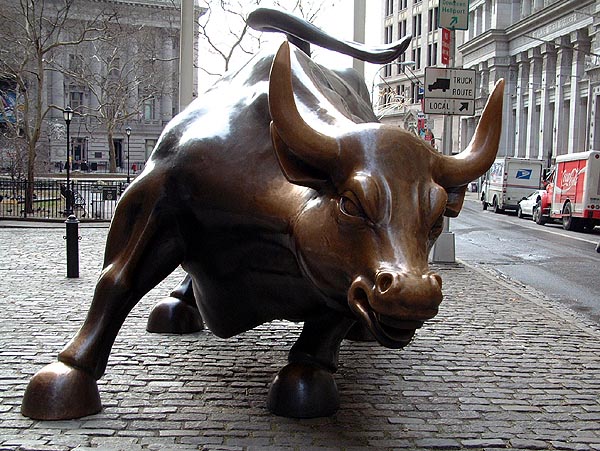Consumer Spending Rebounds Along With Sentiment
WASHINGTON (Reuters) – U.S. consumer spending rose last month for the first time since February as government stimulus pushed incomes sharply higher, the Commerce Department said on Friday, supporting the view the economy was close to pulling out of recession.
Consumer spending, which accounts for over 70 percent of U.S. economic activity, rose 0.3 percent in May after an upwardly revised flat reading in April, the department said.
Mark Vitner, an economist with Wachovia in Charlotte, North Carolina, said that while consumer spending was likely to drop further for the second quarter as a whole, the data suggested it was on a better trajectory heading into the third quarter.
“This confirms our forecast that the economy is going to move into positive territory in the third quarter,” he said.
China Calls For a New Reserve Currency
By Bloomberg News
June 26 (Bloomberg) — China’s central bank renewed its call for a new global currency and said the International Monetary Fund should manage more of members’ foreign-exchange reserves, triggering a decline in the U.S. dollar.
“To avoid the inherent deficiencies of using sovereign currencies for reserves, there’s a need to create an international reserve currency that’s delinked from sovereign nations,” the People’s Bank of China said in its 2008 review released today. The IMF should expand the functions of its unit of account, Special Drawing Rights, the report said….
Cap & Trade May Result in the Closing of Refineries
By Joe Carroll and Edward Klump
June 26 (Bloomberg) — America’s biggest oil companies will probably cope with U.S. carbon legislation by closing fuel plants, cutting capital spending and increasing imports.
Under the Waxman-Markey climate bill that may be voted on today by the U.S. House, refiners would have to buy allowances for carbon dioxide spewed from their plants and from vehicles when motorists burn their fuel. Imports would need permits only for the latter, which ConocoPhillips Chief Executive Officer Jim Mulva said would create a competitive imbalance.
“It will lead to the opportunity for foreign sources to bring in transportation fuels at a lower cost, which will have an adverse impact to our industry, potential shutdown of refineries and investment and, ultimately, employment,” Mulva said in a June 16 interview in Detroit. Houston-based ConocoPhillips has the second-largest U.S. refining capacity.
Australia’s Qantas Airways Ltd. said Friday it had canceled orders for 15 Boeing 787s and delayed the delivery of a further 15 aircraft due to turbulent market conditions.
Qantas Chief Executive Alan Joyce said the decision had not been influenced by Boeing Co.’s announcement earlier this week of a design issue in the 787 and further delay to the aircraft’s first flight. He said discussions with Boeing about the order had started some months ago.
Qantas said it had reached a mutual agreement with Chicago-based Boeing Co. to defer the delivery of 15 Boeing 787-8 aircraft by four years and cancel orders for 15 Boeing 787-9s (which are slightly larger) scheduled for delivery in 2014 and 2015.
Japan To Order C To Hault Banking Operations
By YUKA HAYASHI and ALISON TUDOR
TOKYO – Japan’s financial regulator ordered Citigroup Inc.’s Citibank Japan Ltd. to suspend all promotional sales activities in its retail banking division for one month as punishment for lax compliance in preventing money laundering.
The suspension will start on July 15, the Financial Services Agency said in a press release Friday. The bank, however, is allowed to do business with customers who voluntarily contact the bank to purchase its products.
The agency said it has found “fundamental problems” with Citibank Japan’s compliance and governance systems for detecting and monitoring suspicious transactions including money laundering. The bank also lacked a sufficient system to control dealings with “anti-social forces,” a term used in Japan to describe organized crime groups.
UBS unveils SFr3.8bn equity placement
By Patrick Jenkins in London and Francesco Guerrera and Saskia Scholtes in New York
Published: June 25 2009 21:38 | Last updated: June 26 2009 10:02
UBS moved on Thursday to bolster its balance sheet by raising SFr3.8bn (£2.1bn) in an equity placing, following heightened pressure from regulators, and warned it would record a loss in the second quarter.
The announcements, issued last night, underline the bank’s struggles to rebound from a crisis that caused billions of dollars in losses and forced Berne to come to its rescue.
Comments »



